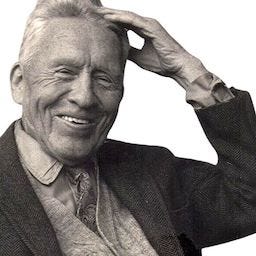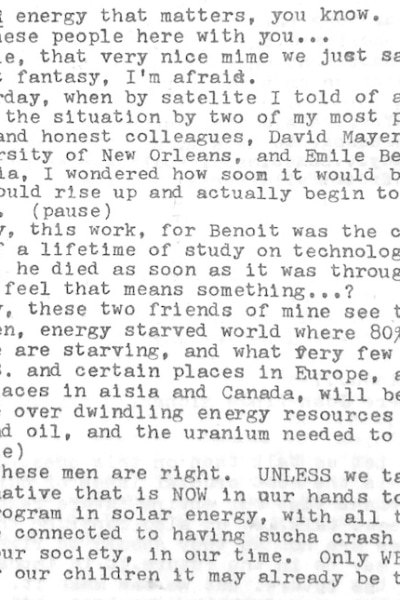The Truth as a Lamp
Welcome! Today’s issue features a Buddhist text that was one of Shamcher’s favourites, a few words from Shamcher on organisation, and some archive treasures: a pdf of the script for a play Shamcher was featured in, and the first of the audio archives, for listening at your leisure.
The Shamcher Bulletin brings you snippets from Shamcher’s writings that might help frame and context our experience of the world we live in today.
A special hello to new subscribers - how good to find you here!
Since Shamcher very often referred to this text of Buddha’s farewell address, we’re repeating it here, before going into a selection from An Interview with Shamcher Beorse.
Therefore, o Ananda, be a lamp unto yourself. Rely on yourself and do not rely on external help, Holding fast to the truth as a lamp.
Seek salvation alone in the truth.
and look not for assistance to anyone besides yourself! And how, o Ananda, can a person be a lamp unto himself?By holding fast unto the truth, holding to the truth as his lamp, Seeking salvation alone in the truth
and not looking to anyone except himself.
And those, who either now, or after I am dead,
shall be a lamp unto themselves, looking only to themselves
and not relying an any external help,
it is they, Ananda, among my bhikkus,
who shall reach the topmost height.
As long as they are anxious to learn.
Today, Americans, and Europeans too, are too eager to run to a teacher in the sense of a guide, and not to even bother with investigating themselves.
The exoteric form is the outer ritual that you see. For example, people taking part in parades, and the rituals one uses at devotional services. These are what one would call obsessional when the persons doing it are not aware of the symbolism and essence within it. They think that the services and the parades themselves are the essential meaning, and this may be dangerous.
The more so when the exoteric form involves the structure of society, and how that structure interacts with peoples’ lives.
I already gave you the example where the government believes itself capable of deciding which scientific technologies are important enough to be developed, whether they know anything about the particular technology or not. By adhering to the form of the society, or what people have come to believe is the form, people resign themselves to the decision of the government without questioning the process by which the decision has been reached, and hence we are stuck on the rather low level of technological advancement that we have today. This goes for church organizations too, the way people will believe that a man simply because he has the title of Bishop or something must be right.
In Sufi organizations of course, we are supposed to be better off than this because we are particularly aware of the unity of things. But there is even there some of this happening, and there are people who take it very seriously when someone who seems to have a higher responsibility says something. But actually the “higher responsibility” in the given situation means nothing more than someone had the particular idea that something should be said. Everyone has the right to say what he feels, in fact it is his duty to see that it gets said. You have the right not to believe that a certain thing must be right or wrong simply because a certain person has said it. Everything which is expressed in words is of rather inferior quality anyway. And it should be remembered that nothing that has ever happened is important, it has been made to be important.
A Script Appears
While I was searching for an image of Shamcher for Wali Ali’s soon to be released book on Murshid SAM, this script fell out of an old envelope. Back in the late 1970’s, at a Canada Camp, they workshopped this participatory production, where everyone in the audience was an unwitting follower, as a few minders with clipboards and lab coats herded the group into a circle. Then the performance occurred. At the camp the script below was modified, not presented as scripted here, in a dialogue accompanied by mime, sound, and poetry. The full performance was at a conference in California.
Read or download the pdf of Shamcher’s copy of the script here.
Shamcher Audio Archive: Canada Camp 1979
The audio archive for this issue is one part of a 4 part series of recorded talks from Canada Camp in 1979. (This recording begins around 0.05, apologies for the variable audio quality.)
Shamcher’s talk is interrupted briefly by Jelaluddin Boru, about a play to be performed. (See script pdf above for more details on that experiment.)
Further into the recording, Shamcher outlines some of his experience with the great Sufi Inayat Khan, offers a description of the benefits of Universal Worship, and comments on walking practices done at the camp.
Throughout, his talks are interspersed with discussion of energy, OTEC, and economics.
Thanks for responding, sharing, and subscribing to these excerpts from the writings and archives of Shamcher Bryn Beorse.
Feel free to reply to this email if you have Shamcher stories, photos or correspondence to share.
The Shamcher Bulletin is edited by Carol Sill, whose newsletter, “Personal Papers”, is HERE.
If you like this post, please click the heart. And your comments are always welcome.





Oops, I just corrected the audio file. Sorry for confusion -- if you listened when you first got the email and wondered why it didn't match the description! It's the right one now. Thanks for your patience.